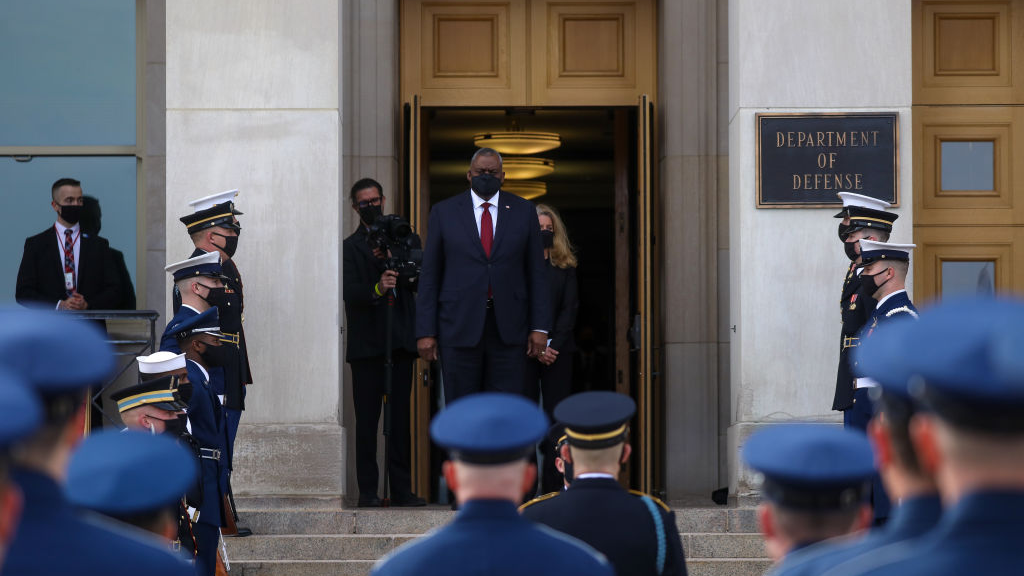
U.S. aircraft carrier USS Ronald Reagan is anchored at the U.S. Navy's base in Yokosuka, eastern Japan, December 15, 2021. /Getty
U.S. aircraft carrier USS Ronald Reagan is anchored at the U.S. Navy's base in Yokosuka, eastern Japan, December 15, 2021. /Getty
Editor's note: Azhar Azam works at a private organization as a market and business analyst and writes on geopolitical issues and regional conflicts. The article reflects the author's views and not necessarily those of CGTN.
Not mentioning his support for the 2003 invasion of Iraq, Joe Biden in 2019 promised to end U.S. wars in Afghanistan and the Middle East and forge new trade agreements to create a more balanced international economy. But just a few months into the White House, he appears to be dialing back on his commitment by submitting a FY2022 defense budget request of $715 billion to Congress for the Department of Defense that topped Donald Trump's FY2021 by 1.6 percent.
Before ratification from the House and Senate, lawmakers added another $25 billion to push Pentagon spending to $740 billion (National Defense Authorization Act and National Defense Toplines: $768 billion and $778 billion respectively including $28 billion for Energy Department's nuclear weapon program and $10 billion for defense-related activities).
The move aiming to keep the U.S. military ahead of China's has shocked defense watchers, expecting at least a flat defense budget after the U.S. pullout from Afghanistan. The staggering surge even surprised the Joint Chiefs of Staff Chairman General Mark Milley who thought the request was just right, having envisaged a budget cut over the pandemic and country's struggling economy.
Ironically, both sides of the aisle agreed to significantly raise the provision to focus on "strategic competition" with China and Russia. On top of that, they managed to conceal the actual national security bill that had quietly reached a stupefying $1.3 trillion if budgets relating to intelligence, defense retirement and health, veteran and international affairs, homeland security and interest on debt were accounted for.
With a view to bolster the Pacific Deterrence Initiative, bipartisan consensus earmarked in excess of $7 billion ($2 billion more than Biden's request) to undermine peace and stability across Asia Pacific "through strength," requiring the U.S. president to develop a "grand strategy" against China. The authorization also booked $4 billion for the European Deterrence Initiative as a counterweight to "rising threats" from Russia.
America's offensive approach would heighten apprehensions about a new Cold War and kill the cooperation between the world's two largest economies on global threats such as climate change and future pandemics. It further takes attention from other pressing domestic priorities like infrastructure, homelessness, white supremacy activities and racial and economic injustice.
Biden's overemphasis on competition with Beijing and scaling back presence in less-vital theaters has worried allies in Europe, the Middle East and other parts of the world. They are expressing their "angst" to his aides about the U.S. reduced regional commitment for "a hazily defined, global contest" with China.
The defense bill drives the U.S. "further into a Cold War with China" and is "likely to fuel a cycle of military escalation" in the Pacific, said progressive Democrat Barbara Lee. Calling it "shameful," the California Representative said "don't ever tell me we can't afford to invest in our communities when we just approved $778 billion for the Pentagon."

U.S. Secretary of Defense Lloyd Austin standing at the entrance of the Pentagon in Arlington, Virginia, December 9, 2021. /Getty
U.S. Secretary of Defense Lloyd Austin standing at the entrance of the Pentagon in Arlington, Virginia, December 9, 2021. /Getty
A rise of more than 5 percent or about $37 billion from last year's $703.7 billion in the defense budget doesn't tally with Pentagon's claim to address threats to global security such as climate change and the pandemic. More ship, jet and fighter plane purchases and disproportionate concentration on "strategic competition" with China suggest the U.S. military isn't keen on losing the title of the world's largest institutional consumer of fossil oil.
Between 2001 and 2017, the Pentagon emitted 1.2 billion metric tons of greenhouse gasses and roughly consumed 80 percent of all U.S. government energy consumption. If it were a nation state, the Pentagon would have been the 47th largest carbon dioxide emitter in the world. There seems to be a whole-of-government approach as one of the biggest climate polluters in history continues its reliance on for-profit defense contractors, responsible for U.S. mission failures and prime beneficiaries (one-third to one-half) of the Pentagon's $14 trillion war spending in Afghanistan, to keep the planet contaminated for mankind and all living organisms.
The Pentagon recently announced Biden has accepted recommendations of the Global Posture Review formed by Austin. As expected, it makes the Indo-Pacific a priority region and considers Beijing as a "pacing challenge." The assessment directs "additional cooperation" with allies to advance initiatives – including gaining greater regional access for military activities, enhancing infrastructure in Guam and Australia and constructing military installations across the Pacific Islands – to contribute to regional stability and deter China and the DPRK.
Clearly, the analysis of U.S. forces' worldwide deployment is blatantly threatening the regional peace through the AUKUS, a trilateral alliance stoking concerns of an arms race within the Pacific nations. The stark contrast, pursuing stability and seeking confrontation simultaneously by relocating military assets from the Middle East to the Indo-Pacific, shows the U.S. still believes it can play the role of a global policeman and wage and win a new Cold War. Yet the idea is being contested strongly.
The mostly-classified document bewildered even a former Pentagon official who, over growing sense of the U.S. unreliability, doubted Washington would ever obtain the level of cooperation from the region. The Biden administration's shrill focus on China while downplaying threats to NATO in Northern and Central Europe and absence of changes in American force posture in Southern Europe and the Mediterranean made the review a "highly disappointing product" for him.
America is facing "devastating" impacts of shutdown and debt default and experiencing the worst economic downturn since the Great Depression of the 1930s. On Tuesday, the U.S. Senate barely managed to avert a default by increasing the debt ceiling; it's just a stopgap solution. To overcome the country's deafening economic and other internal challenges, Washington must toss out its Cold War posturing reflected in the "strategic competition" with China, and ease pressure from the $29-trillion indebted nation.
(If you want to contribute and have specific expertise, please contact us at opinions@cgtn.com.)

